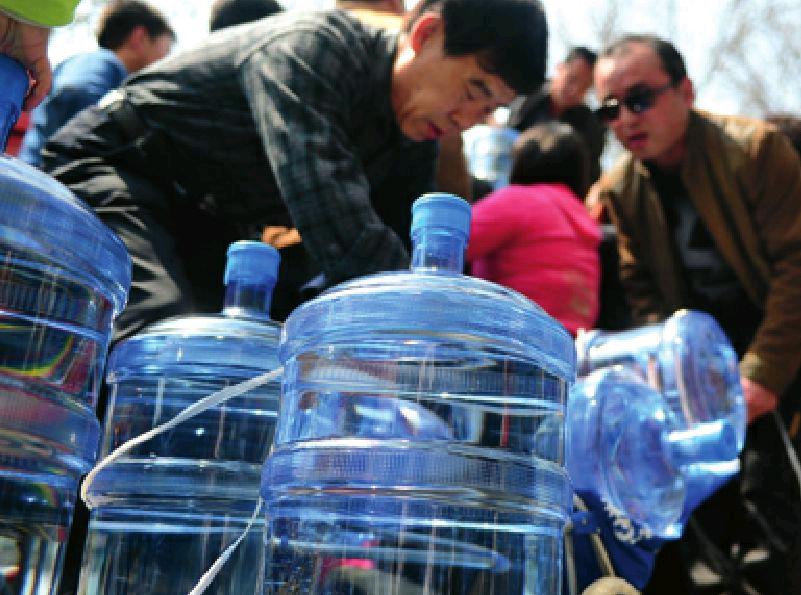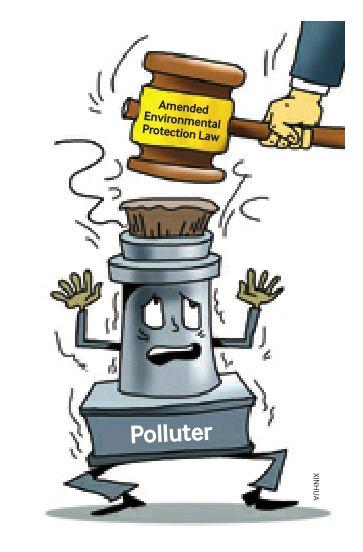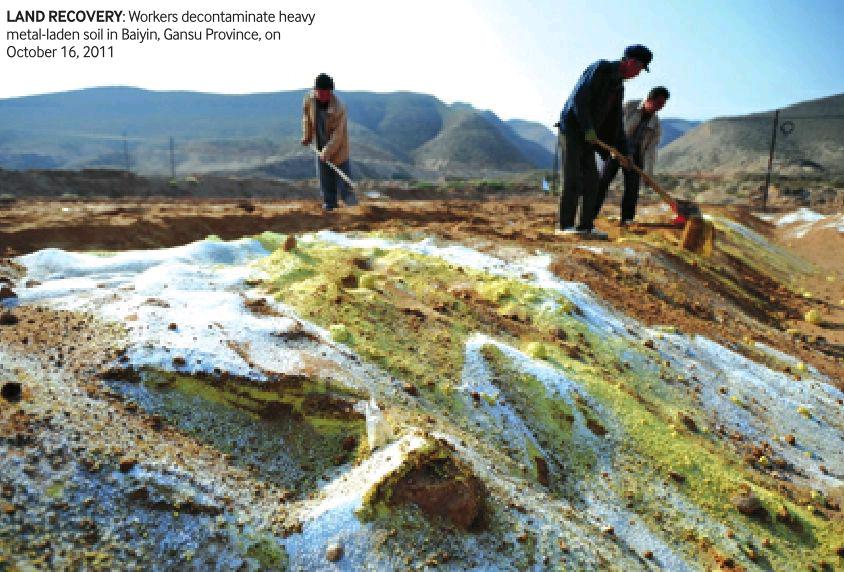Saving the Ecosystem
2014-06-05ByYinPumin
By+Yin+Pumin
On April 24, the Standing Committee of the National Peoples Congress (NPC), Chinas top legislature, approved the most sweeping revisions of the Environmental Protection Law in more than two decades. The changes bring the promise of tougher penalties for those polluting the environment.
Environmental experts have welcomed the amendments, saying that they could not have come at a better time.
For the past 25 years, the law had not been changed since it took effect in 1989. In August 2012, a draft amendment was submitted to the NPC Standing Committee for its first deliberation, starting the two-year amendment process.
After heated debates and four readings of the draft, the much-anticipated revisions expanded the law to add 23 new articles, bringing the total up to 70. The additions ensure that environmental protection is enshrined as the countrys overriding priority, and include specific articles and provisions on tackling smog.
The revised law will go into effect from January 1, 2015.
Chai Fahe, vice President of the Chinese Research Academy of Environmental Sciences, said that he was impressed by the new law. “With its long-term scope and legally binding solution, the amended law has prepared a sound legal basis for pollution prevention and control and will guarantee their implementation,” he said.
Chai also praised the new laws clear stipulations on local governments responsibility to ensure environmental quality and the accountability system that will punish those who fail to do so. He suggests that such provisions should be enforced with effective measures.
Chai added that the new law is also expected to advance amendment to other environmental laws, such as the Law on Air Pollution Control, which experts believe needs more detailed, specific and practical terms.
Legislations on air, water and soil pollution were included in the NPC Standing Committees five-year legislation plan for 2013-18, which was released last October.
Its reported that a draft amendment to the Law on Air Pollution Control will be tabled for the first reading in the NPC Standing Committee in December, and the Ministry of Environmental Protection (MEP) is working on a draft soil pollution control law. Preparatory work on a water pollution control law allegedly has also started.
Zhao Deming, an NPC Standing Committee member, said that air, water and soil are the basic components of the environment. The enactment and revision of laws concerning the prevention and control of air, water and soil pollution will facilitate the implementation of the Environmental Protection Law, according to him.endprint
The new law will be a strong measure for dealing with pollution, said yuan Jie, Director of the Office for Administrative Law with the Legislative Affairs Commission of the NPC Standing Committee.
The law says that the country ought to establish and improve an environment and health monitoring, survey and risk assessment mechanism.
“This would help to curb the pollution at its source,” yuan said.
Tougher punishments
Though pollution prevention and control have been on the top of the Chinese Governments agenda for years, problems still persist.
According to a report issued in April, nearly 60 percent of areas monitored in China last year had a “very poor” or “relatively poor” underground water quality.
Another report issued jointly by the MEP and the Ministry of Land and Resources on April 17 showed that about 16.1 percent of the countrys soil is polluted.
Above all, heavy smog caused by industrial activities, coal burning and motor vehiclesemissions, which have frequently shrouded Beijing, Shanghai and other major cities across China over the past few years, causes the most concern.
Decades of rapid economic growth have taken their toll on Chinas ecology, while disturb- ingly lenient penalties have allowed for runaway environmental pollution, experts say. They warn that facing mounting public discontent over a deteriorating environment, strict implementation of the new Environmental Protection Law is more important than ever.
The latest round of reforms aimed at steering the country to transform its growth pattern is believed to offer a unique opportunity to address the issue.
At the annual full session of the NPC in March, Premier Li Keqiang “declared war” on pollution and pledged to fight it with the same determination with which the country battles poverty.
Echoing Lis declaration, lawmakers have hammered out harsher penalties for polluters and written them into the new Environmental Protection Law.
The law stipulates that enterprises will be named and shamed for breaking environmental protection laws.
According to the law, responsible persons will face up to 15 days in detention if they are found guilty of the following: Their enterprises skirt around environmental impact assessments and refuse to suspend production after receiving a ban; they fail to obtain a pollutant discharge permit but discharge pollutants, and refuse to suspend the discharge after administrative bodies issue a ban; or they shirk supervision through means including forging monitoring data or improperly operating pollution prevention equipment. The length of their detention will depend on the impacts of their violations.endprint
It has also been stipulated that responsible persons should face the same punishments if their enterprises produce or use forbidden pesticides and refuse to make corrections.
Explaining the changes, lawmakers said that they originated from a desire to rectify the previously lenient penalties, which have caused severe problems for the environment.
Xin Chunying, Deputy Director of the Legislative Affairs Commission of the NPC Standing Committee, gave an example during the deliberation of the new Environmental Protection Law, saying that it needs 500,000-600,000 yuan ($80,150-96,180) to alleviate and control pollution on a daily basis when running an electricity generator complex with production capacity of 100,000 kW. But if the power plant shuts down its pollution treatment equipment and does nothing to protect the environment, it may only face a 10,000-yuan($1,603) fine, she said.
“The phenomena in which the cost for observing environmental legislation is higher than violating laws is frequently seen, causing environmental pollution,” Xin said.
The new law states that organizations in charge of environmental impact assessments and supervision would bear joint liabilities if they are found to have acted fraudulently.
According to the law, local officials may be demoted or sacked, if they are found guilty of misconduct, including covering up environmental wrongdoing, falsifying data or asking others to falsify data, failing to publicize environmental information that should be made public according to law or failing to give closure orders to enterprises that illegally discharge pollutants. If offenders behavior constitutes a crime, they will be held criminally responsible.
The law introduces a daily-based fine system without upper limits to punish offenders. As a result, if an enterprise illegally discharges pollutants and refuses to make corrections as required by authorities, it may face a fine that accumulates daily. In the past, such enterprises received only a one-off fine.
Hu Jianmin, vice President of state-owned power company China Huaneng Group, admitted that enterprises may feel the pressure of harsher punishments under the new law.“Companies that are diligently following regulations will be least affected,” Hu said. He added that the new law will also bring about new opportunities to transform and upgrade enterprises as well as for the development of the clean energy market.endprint
Zhang Guozhi, Deputy Director of the Environmental Protection Division with the Taiyuan Iron and Steel Group in north Chinas Shanxi Province, agreed. “Enterprises that observe environmental regulations usually invest more in reducing pollution, and stiff punishments will get rid of the inappropriate advantages available to polluters, acting as a protection for quality businesses,” Zhang said.
Bie Tao, Deputy Director of the MEPs Department of Policies, Laws and Regulations, said that the amended law has impressed him with its support for the research and application of environment-related sciences and technologies, and financial aid to help develop the environmental protection industry.
However, officials and experts also stress that a strict law requires strict enforcement and the whole society should be encouraged to combat pollution.
“Good environmental legislation only gets you halfway there. It needs to be implemented,” vice Minister of Environmental Protection Pan yue told Xinhua News Agency in an interview on April 28.
Calling the new law“the most powerful environmental legislation in the country,” Pan said that it could still fail without strict enforcement.
Class litigations
The number of environmental pollution cases in China has grown more than 20 percent annually since 1996, according to Sun youhai, Director of the China Institute of Applied Jurisprudence of the Supreme Peoples Court, Chinas highest judicial body, at a forum in Guiyang, southwest Chinas Guizhou Province, last July.
Sun said that more than 300,000 letters of accusations related to environmental pollution were filed from 2006 to 2010, but less than 1 percent ended up becoming court cases, mostly due to vague descriptions in the previous Environmental Protection Law that defines who is eligible to file lawsuits against polluters.
Earlier media reports also revealed that because individual citizens and non-governmental organizations (NGOs) do not have the right to initiate class action lawsuits against polluters, the dozens of environmental courts in China have almost no cases to process. In the meantime, environmental pollution continues to worsen in the country.
In a most recent environmental emergency on April 11, more than 2.4 million residents in Lanzhou, capital of northwest Chinas Gansu Province, were affected when excessive levels of benzene, a carcinogenic chemical, was found in the citys tap water supply. The pollutants were later confirmed to have leaked from a pipeline belonging to Lanzhou Petrochemical, a subsidiary of China National Petroleum Corp., the countrys largest oil company.endprint
Five residents in Lanzhou tried to suing veolia Water Corp., the main water supplier in the city, for failing to guarantee its water quality and providing unsafe water after the incident. However, a local court refused to accept the case on the grounds that as individuals, the five people did not have the right to file the lawsuit.
Meeting public expectations, the new Environmental Protection Law allows class action lawsuits on environmental issues and expands the range of subjects for such litigations.
Zhai yong, head of the Law Chamber of the Environmental Protection and Resources Conservation Committee of the NPC, said that legislators had debated over which organizations should be eligible to file class action lawsuits against polluters.
The new law lists three specific requirements for NGOs to be eligible for class action suits: They must have been registered with civil affairs departments of governments at city level or above over the past five years; they must prove they have been engaged in protecting the environment for more than five years and they must have good reputations.
Courts should receive class litigations on environmental issues in accordance with the law, while NGOs should not seek to profit through such litigations, the new Environmental Protection Law states.
“The change may raise the number of qualified organizations from less than 100 to several hundred,” said Ma yong, Director of the Supervision and Litigation Department at the Environmental Legal Service Center of the AllChina Environment Federation, one of the most active organizations in the field of environmental class action lawsuits.
By promoting class litigations, environmental activists hope that the publics desire for a better environment can be addressed through the rule of law, instead of resorting to protests.
China has faced an increasing number of protests, sometimes referred to as “mass incidents,” over environmental issues in recent years. A few cities have seen residents take to the streets against petrochemical projects, which they believe are a major threat to the environment and public health. In most of the cases, the projects in question were later suspended.
In a recent case, more than 1,000 people took to the streets in Maoming, a major Chinese petrochemical production base in south Chinas Guangdong Province, to protest against a paraxylene (PX) project in late March. PX is used for making a number of polyester products.endprint
The PX project was approved in 2012 with an annual production capacity expected to meet 600,000 tons.
While hailing the new legislation as progressive, experts admit that difficulties remain.
“The requirement that qualified environmental organizations must have been registered with civil affairs departments for more than five years may be very hard to reach for many organizations because the registration procedure has been open nationwide for less than two years,” said yang Sujuan, Deputy Director of Environmental and Natural Resources Law Research Institute with the China University of Political Science and Law.
“To get involved with such lawsuits, an or- ganization needs to have a professional team, including not only legal experts but also chemists,” said Ma with the All-China Environmental Federation. “They may also need to be prepared to spend three to five years on one case.”
Ma expects the number of environmental class action lawsuits across the country to increase after the new Environmental Protection Law is put into effect, but added that the total would not soar dramatically because “not many would be willing to spend such a large amount of money and time doing something as painstaking as this.”
However, yuan with the Legislative Affairs Commission of the NPC Standing Committee said that the standard has been set following international practices.
“Environmental class action lawsuits must be handled by professionals because relevant evidence is hard to collect. The prosecution must be familiar with environmental issues and have good social credibility,” yuan said.endprint
